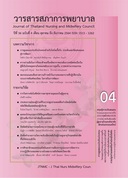Competency and Career Path of Nurses in Thai Correctional System: Opportunities for Development
Keywords:
competency, career path, correctional facility nurses, inmates, prisonsAbstract
A prison is a community of a large number of inmates many of whom suffer health problems ranging from underlying diseases to diseases acquired during imprisonment. This condition necessitates multi-dimensional healthcare, including health promotion, disease prevention, medical treatment, and rehabilitation. Because nurses operating in a correctional facility play a signifcant part in providing healthcare services for the inmates, these nurses are expected to possess task-specifc, in addition to principal and general professional, competency. These nurses are also expected to possess legal and ethical understanding, along with skills in coordinating with offcials from other correctional divisions to arrange proper healthcare services for the inmates. Correctional facility nurses, therefore, should be trained to enhance their specifc competency in response to their role in providing healthcare services for inmates who have complicated health problems and are confned to a more disease-prone environment than are ordinary people. Also, a career path for correctional facility nurses should be more clearly defined.
This article discusses issues related to the working condition of correctional facility nurses, their required areas of competency, and their career path. The recommendations offered, which are applicable to the policymaking, organisational, and individual levels, are concerned with the direction of developing correctional facility nurses’ competency and career path, to optimise their potential, lift their morale, and increase their motivation to continue serving in correctional facilities.
Downloads
References
Medical Services Division, Department of Corrections. Statistics of illness inmates in prison and statistics of
medical referral for sick inmates in past 5 years B.E. 2559-2563. Medical Treatment Promotion Section. 2021 [cited 2021 Feb 1] (in Thai)
Medical Services Division, Department of Corrections. Statistics of cause of illness inmates in prison in B.E.
Medical Treatment Promotion Section. 2020 [cited 2021 Feb 1] (in Thai)
Vajasara K, Prapavadee O, Ratcharoenkajohn S, Krabuansaeng J. Getting sick behind bars: health issues and prison health care. Bangkok: Duen Tula Publishing House; 2018. (in Thai)
Puektes S, Sawasdipanich N, Khasemophas D, Lohacheewa S, Thongpaiboon P, Rojanaprasert P, et al. Analysis of approaches to improving the healthcare facility for women’s inmates. Thai Journal of Nursing Council 2017;32(1):94-114. (in Thai)
Sawasdipanich N, Puektes S, Sriyaporn A, Chawmathagit C. Work experience of nurses in Thai correctional system. Thai Journal of Nursing Council 2015;30(3): 39-53. (in Thai)
Moroney MK. Caring and custody: Two faces of the same reality. J Correct Health Care 2005;1(2):157-69.
Almost J, Doran D, Ogilvie L, Miller C, Kennedy S, Timmings C, et al. Exploring work-life issues in provincial
corrections setting. J Forens Nurs 2013;9(1):3-13.
Dhaliwal K. Caring in correctional nursing: a systematic search and narrative synthesis. J Forens Nurs 2016;
(1):5-12.
Gonzalez-Galvez P, Sanchez-Roig M, Coll Camara A, Canet Velez O, Roca Llobet J. Ethic conflicts in nursing
care in the prison context. Rev Esp Sanid Penit 2018; 20:95-102.
Saraban J. Medical referral for sick prisoners. Public Health & Health Laws Journal 2018;4(2):267-78. (in Thai)
Marrelli AF, Tondora J, Hoge M A. Strategies for developing competency models. Admin Pol Ment Health 2005;32(5):533-61.
Fey MK. Miltner RS. A competency-based orientation program for new graduate nurses. JONA 2000; 30(3):126-32.
International Council of Nurses. Position statement: nurses’ role in the care of detainees and prisoners. Geneva, Switzerland; 2011.
American Nurses Association. Correctional nursing scope and standards of practice. 2nded. Silver Spring,
MD: American Nurses Association; 2013.
Royal College of Nursing. Competence Framework: Health & Justice Sector. [cited 2021 Jan 11]; Available
from: https://www.england.nhs.uk/south/wp content/ uploads/sites/6/2017/03/health-justice-competence-framework.pdf
Sancchez-Roig M. Coll-Camara A. Prison nursing and its training. Rev Esp Sanit Penit 2016;18:110-18.
Thailand Nursing and Midwifery Council. Core competencies of registered nurses. [Internet]. 2018 [cited 2021 April 2]. Available from: https://www.tnmc.or.th/004.pdf (in Thai)
Srisatidnarakul B. Leadership and strategy management in nursing organization for the twenty first century.
nd ed. Bangkok: Chulalongkorn University Printing House; 2008. (in Thai)
Human Resource Administration Division, Department of Corrections. Transfer and turnover rate of nurses
in correctional system past 3 years B.E. 2561-2563. Human Resource Administration Division. 2021 [cited 2021 Feb 10] (in Thai)
Perry J, Bennett C, Lapworth T. Education and career opportunities for nurses in offender health care. Nurs Stand 2010;24(43):35-9.
Shelton D, Barta B, Reagan LA. Correctional nurse competency and quality care outcomes. JEPCH 2018;2(1):73-98.
Sawasdipanich N, Puektes S, Wannasuntad S, Sriyaporn A, Chawmathagit C, Sintunava J, Paungsawad G.
Development of healthcare facility standards for Thai female inmates. Int J Prison Health 2018;14(3): 163-74.
United Nation Office on Drugs and Crime. United nation standard minimum rules for the treatment of prisoners (the Nelson Mandela Rules). Justice Section, Division for Operations Vienna International Centre. [cited 2021 Feb1]; Available from: https://www.unodc.org/documents/justice- and-prison-reform/ Nelson_Mandela_Rules-E-ebook.pdf
Enhancing Lives of Female Inmates Project, Office of Justice Affairs, Ministry of Justice. United Nations rules for the treatment of women prisoners and non-custodial measures for women offenders (the Bangkok Rules). Bangkok: Bophit Printing; 2010. (in Thai)
Shelton D, Weiskopf C, Nicholson M. Correctional nursing competency development in the Connecticut
correctional managed health care program. J Correct Health Care 2010;16(4):299-309.








